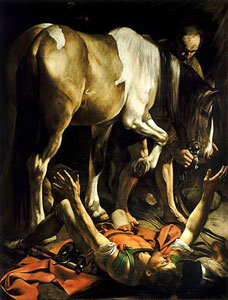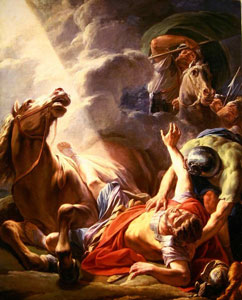On January 25 we remember how Saul (or Paul) of Tarsus, formerly a persecutor of the early Christian Church, was led by God’s grace to become one of its chief spokesmen. Here are two art works that depict the event :


“The Conversion on the Way to Damascus; ” (1601) “ The Conversion of St. Paul ” Nicolas-Bernard Lepicie, 1767
"and suddenly a light from heaven shined round about him. And falling on the ground, he heard a voice saying to him: Saul, Saul, why persecutest thou me? Who said: Who art thou, Lord? And he: I am Jesus whom thou persecutest. " Acts 9: 3-5
Italian painter Caravaggio painted the one on the left in 1601 for the Cerasi Chapel of the church of Santa Maria del Popolo, in Rome. The painting depicts the moment recounted in Chapter 9 of Acts of the Apostles when Saul, soon to be the apostle Paul, fell on the road to Damascus.
Caravaggio is close to the Bible. The horse is there and, to hold him, a groom, but the drama is internalized within the mind of Saul. There is no heavenly apparition. He lies on the ground stunned, his eyes closed as if dazzled by the light.
Caravaggio’s style featured a dark background with usually one point of breaking light. Paul is flung off of his horse and is seen on his back on the ground. Although Paul reflects the most light out of all the characters, the attention is given to him in a strange way. Because Paul is on the ground, he is much smaller than the horse, which is also at the center of the painting but he is pictured closer to the viewer.
The second painting constrast with Caravaggio in the use of color and light. This one has some of the most vibrant colors. Heaven’s light is shown coming dynamically from left to right. The painting is like the key frame in a movie on the conversion. At the time Lepicie was a professor at the Royal Academy of Painting and Sculpture in Paris

 Rembrandt returned to the subject, "Presentation of Jesus in the Temple" at least 5 times from 1627 to 1654, two paintings, three etchings.
Rembrandt returned to the subject, "Presentation of Jesus in the Temple" at least 5 times from 1627 to 1654, two paintings, three etchings. The lessons today are all about spiritual considerations. If you spend a little time with them, the lessons are all about the spiritual nature of what it means to live in this world before God. So with that in mind there are really four things I want to talk about today. One is knowledge and kinds of knowledge . There are two kinds of knowledge – there’s spiritual knowledge, there’s intellectual knowledge and there’s also this basic drive that human beings have for wholeness. Then I want to talk a little bit about symbols and how they are an expression of our spiritual lives.
The lessons today are all about spiritual considerations. If you spend a little time with them, the lessons are all about the spiritual nature of what it means to live in this world before God. So with that in mind there are really four things I want to talk about today. One is knowledge and kinds of knowledge . There are two kinds of knowledge – there’s spiritual knowledge, there’s intellectual knowledge and there’s also this basic drive that human beings have for wholeness. Then I want to talk a little bit about symbols and how they are an expression of our spiritual lives.
